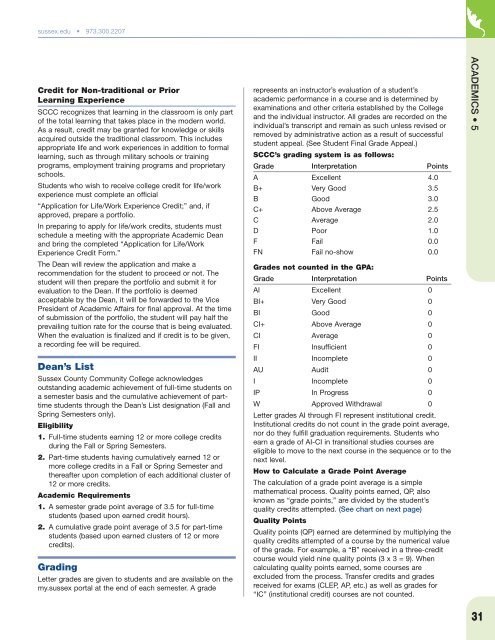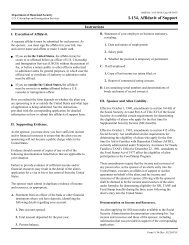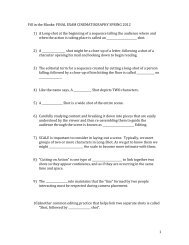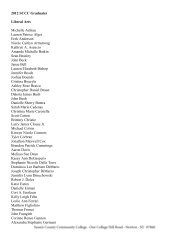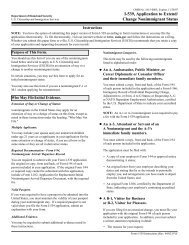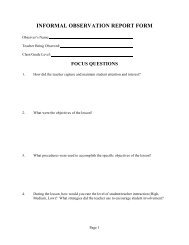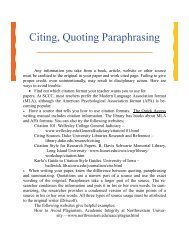Catalog - Sussex County Community College
Catalog - Sussex County Community College
Catalog - Sussex County Community College
You also want an ePaper? Increase the reach of your titles
YUMPU automatically turns print PDFs into web optimized ePapers that Google loves.
sussex.edu • 973.300.2207Credit for Non-traditional or PriorLearning ExperienceSCCC recognizes that learning in the classroom is only partof the total learning that takes place in the modern world.As a result, credit may be granted for knowledge or skillsacquired outside the traditional classroom. This includesappropriate life and work experiences in addition to formallearning, such as through military schools or trainingprograms, employment training programs and proprietaryschools.Students who wish to receive college credit for life/workexperience must complete an official“Application for Life/Work Experience Credit;” and, ifapproved, prepare a portfolio.In preparing to apply for life/work credits, students mustschedule a meeting with the appropriate Academic Deanand bring the completed “Application for Life/WorkExperience Credit Form.”The Dean will review the application and make arecommendation for the student to proceed or not. Thestudent will then prepare the portfolio and submit it forevaluation to the Dean. If the portfolio is deemedacceptable by the Dean, it will be forwarded to the VicePresident of Academic Affairs for final approval. At the timeof submission of the portfolio, the student will pay half theprevailing tuition rate for the course that is being evaluated.When the evaluation is finalized and if credit is to be given,a recording fee will be required.Dean’s List<strong>Sussex</strong> <strong>County</strong> <strong>Community</strong> <strong>College</strong> acknowledgesoutstanding academic achievement of full-time students ona semester basis and the cumulative achievement of parttimestudents through the Dean’s List designation (Fall andSpring Semesters only).Eligibility1. Full-time students earning 12 or more college creditsduring the Fall or Spring Semesters.2. Part-time students having cumulatively earned 12 ormore college credits in a Fall or Spring Semester andthereafter upon completion of each additional cluster of12 or more credits.Academic Requirements1. A semester grade point average of 3.5 for full-timestudents (based upon earned credit hours).2. A cumulative grade point average of 3.5 for part-timestudents (based upon earned clusters of 12 or morecredits).GradingLetter grades are given to students and are available on themy.sussex portal at the end of each semester. A graderepresents an instructor’s evaluation of a student’sacademic performance in a course and is determined byexaminations and other criteria established by the <strong>College</strong>and the individual instructor. All grades are recorded on theindividual’s transcript and remain as such unless revised orremoved by administrative action as a result of successfulstudent appeal. (See Student Final Grade Appeal.)SCCC’s grading system is as follows:Grade Interpretation PointsA Excellent 4.0B+ Very Good 3.5B Good 3.0C+ Above Average 2.5C Average 2.0D Poor 1.0F Fail 0.0FN Fail no-show 0.0Grades not counted in the GPA:Grade Interpretation PointsAI Excellent 0BI+ Very Good 0BI Good 0CI+ Above Average 0CI Average 0FI Insufficient 0II Incomplete 0AU Audit 0I Incomplete 0IP In Progress 0W Approved Withdrawal 0Letter grades AI through FI represent institutional credit.Institutional credits do not count in the grade point average,nor do they fulfill graduation requirements. Students whoearn a grade of AI-CI in transitional studies courses areeligible to move to the next course in the sequence or to thenext level.How to Calculate a Grade Point AverageThe calculation of a grade point average is a simplemathematical process. Quality points earned, QP, alsoknown as “grade points,” are divided by the student’squality credits attempted. (See chart on next page)Quality PointsQuality points (QP) earned are determined by multiplying thequality credits attempted of a course by the numerical valueof the grade. For example, a “B” received in a three-creditcourse would yield nine quality points (3 x 3 = 9). Whencalculating quality points earned, some courses areexcluded from the process. Transfer credits and gradesreceived for exams (CLEP, AP, etc.) as well as grades for“IC” (institutional credit) courses are not counted.ACADEMICS • 531


